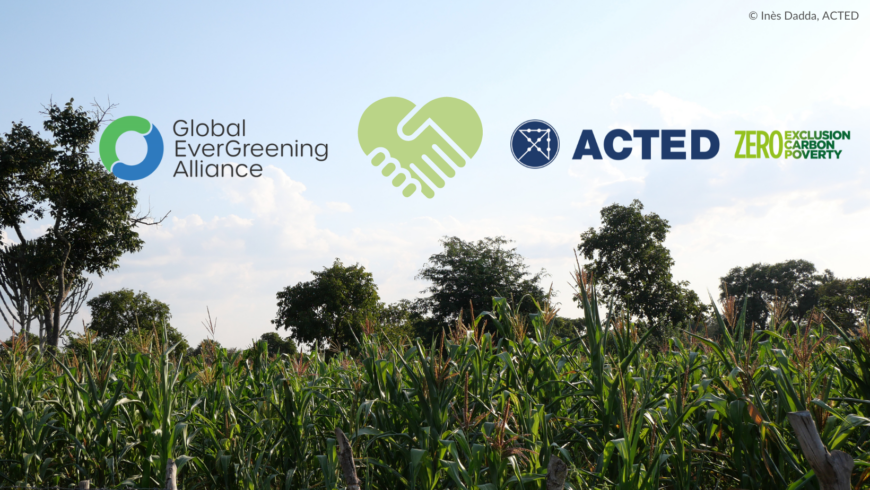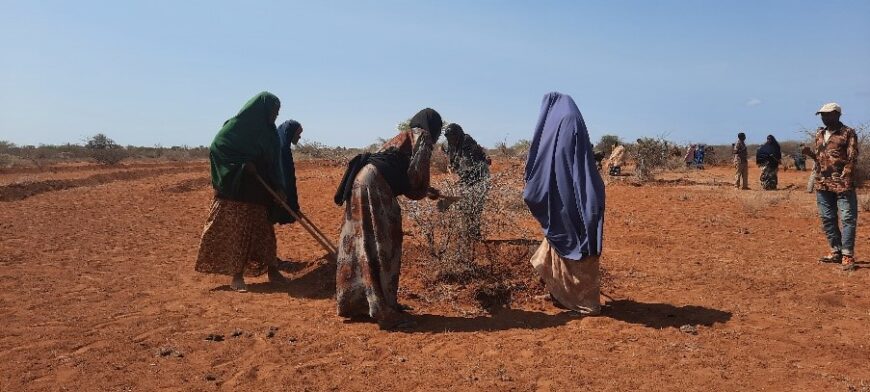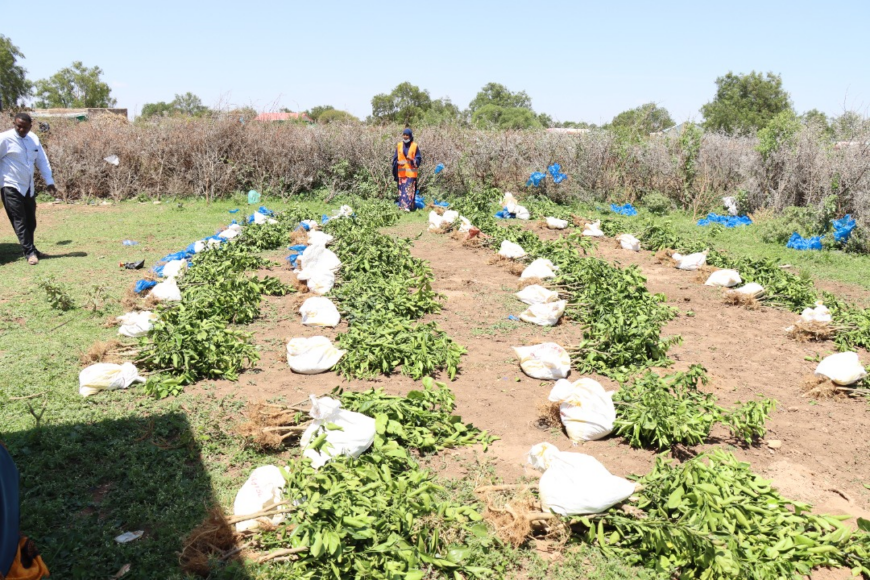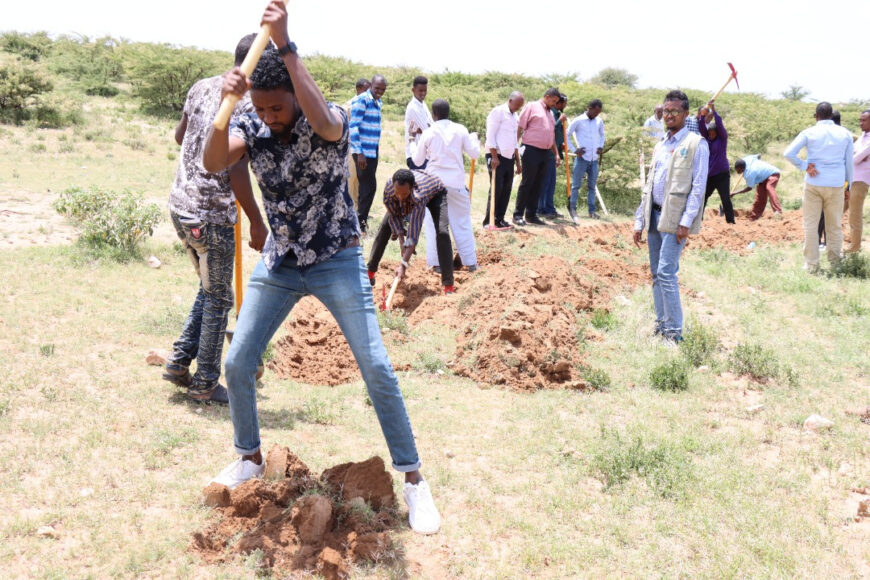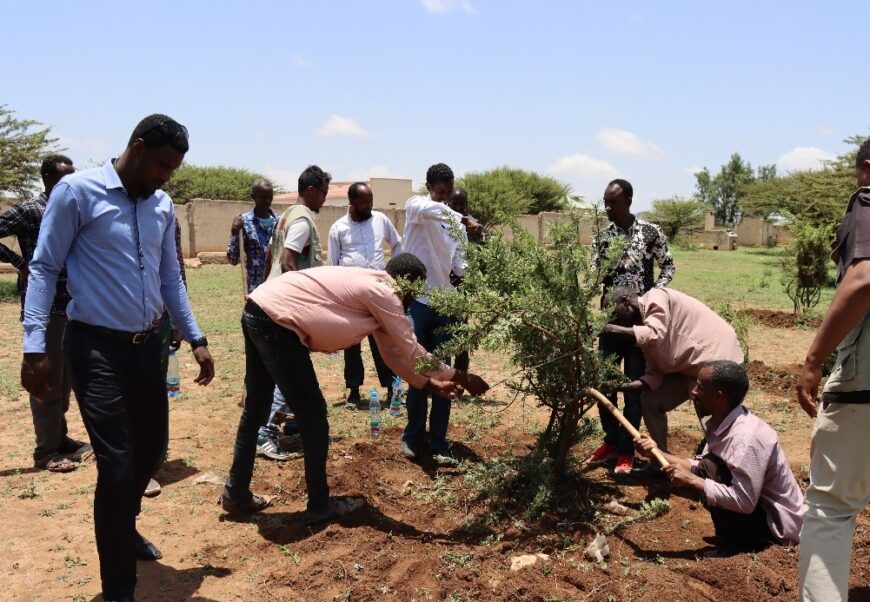Each passing year continues to reveal the increasing scale of our planetary crisis, sparking major global discussions on climate action and biodiversity. The 2022 Global Risk Report says 4 out of the 5 first risk faced by humanity are linked to the environment. Armed conflict, the Covid-19 pandemic, and the growing climate crisis are derailing decades of hard-won gains in education, food security, gender equality, and healthcare in humanitarian contexts.
Towards Holistic Resilience in Vulnerable Environments (THRIVE)
Acted teams see the devastating impacts of climate change around the world first hand. As a response, we developed THRIVE, a holistic approach to building resilience of agro-pastoral communities.
Climate change is seen as a root cause of famine, which is a “real and terrifying possibility” in 43 countries. The World Bank predicts the climate crisis could force more than 216 million people across six regions to move within their countries by 2050, leading to the emergence of “hotspots of internal climate migration” as early as 2030. Degraded landscapes are expanding at an alarming rate due to destructive practices and climate change – contributing to a cycle of worsening climate shocks, food and water insecurity. This in turn destroys people’s livelihoods, drives migration, and creates conflict over decreasing natural resources. Land degradation affects all types of land, from cities and rangelands to farmland and wilderness. While often evident on the surface, it is the hidden and insidious deterioration in the physical, chemical, and biological properties of soil, water, and biodiversity that creates the most damage.
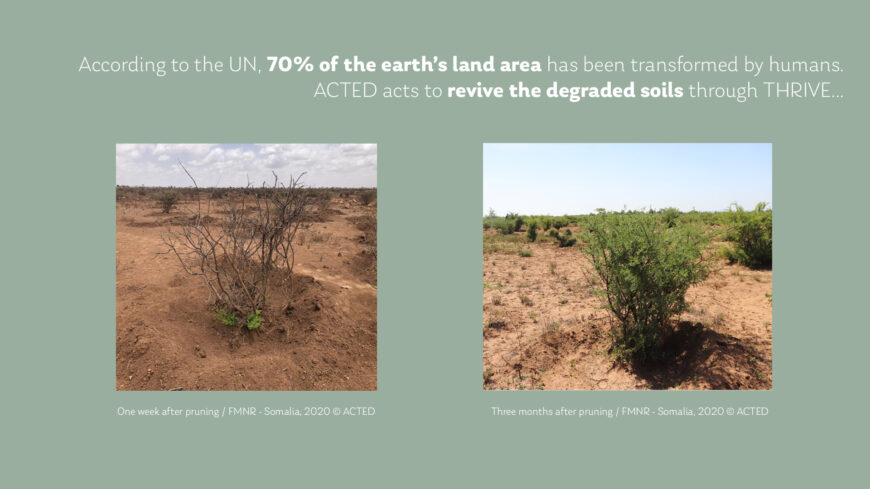
Responding to climate disasters—including drought, floods, extreme weather, increased incidence of disease, and growing food and water insecurity— soaks up a large proportion of funding dedicated to humanitarian actions each year. These disasters most acutely affect low-income countries, even though they account for just 0.5 percent of global carbon dioxide emissions, while having the strongest impact on the highly vulnerable in these countries, who lack the means to prepare, mitigate or adapt to the changes.
A solution is needed that addresses both the short term and structural challenges and prepare the most vulnerable persons and communities to face down these new challenges through climate change adaptation and mitigation strategies while working to restore balance to our natural environment.
Looking at new ways to build resilience
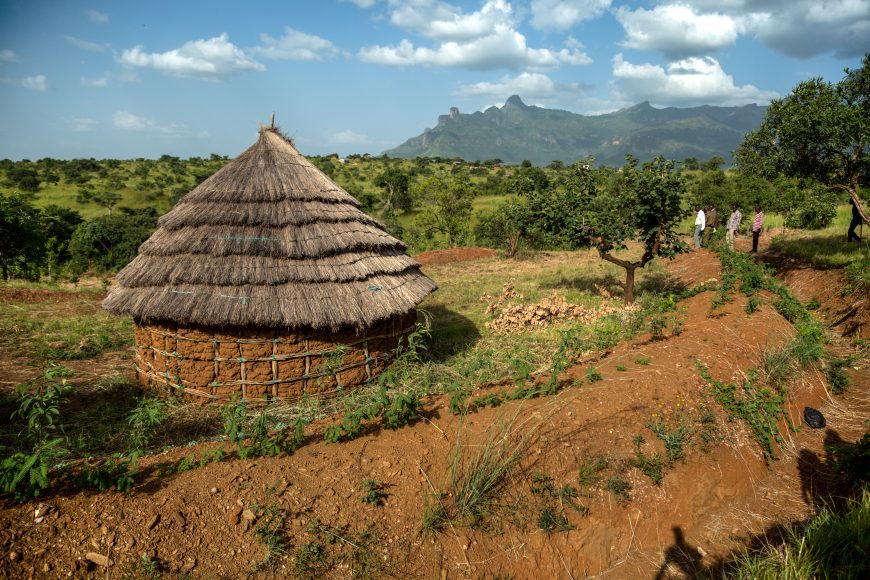
To address these problematics, Acted is going back to basics; exploring the ways that humans interact with the ecosystems in which they live and upon which their livelihoods rely.
THRIVE – Towards Holistic Resilience in Vulnerable Environments – was developed as an Acted Flagship Initiative to address both the immediate and structural issues of climate change and land degradation in a holistic manner in rural rangeland ecosystems. THRIVE reimagines ecosystem services through renegotiating the contract between individuals, communities and the land. With a goal of supporting the Sustainable Development Goals – THRIVE works to restore the natural environment, protecting agro-pastural livelihoods while ensuring defence against natural disasters and climate change as key pillars of building resilient rural agricultural populations.
THRIVE is centered on interactions among systems
THRIVE is Acted’s solution to address these issues through a nexus approach, reversing landscape degradation and increasing the socioeconomic health and stability of communities around the world. THRIVE targets areas of arid and semi-arid rangelands with agricultural, pastoralist or agro-pastoralist populations.
THRIVE is aligned with the international goals of the SDGs, the UN Convention to Combat Desertification, the COP 21, the new European Green Deal, and the UN Decade on Ecosystem Restoration (2021-2030).
THRIVE dares the aid sector to delve deeper into the lives of the communities which they help, to come to a greater understanding of the interplay between the ecosystem, social networks, governance and local economies. But what does this approach entail?
THRIVE revolves around three pillars:
REVIVE – REGENERATIVE EARTHWORKS AND VEGETATION FOR VIBRANT ECOSYSTEMS
ACTED’s Approach to Ecosystem Restoration
REVIVE is the first stage where interventions aim to rehabilitate degraded soils by restoring the balance in water, carbon, and nutrient cycles – creating the conditions for a bio-diverse array of vegetation to thrive while sinking water and carbon back into the ground to recharge the landscape.
REVIVE uses simple, nature-based solutions that promote the recharge of ground water and prevent soil erosion caused by harmful practices. Communities are encouraged to rethink how and what they cultivate to promote increased vegetation, while integrating land management planning and regenerative grazing to improve the understanding and beneficial co-existence between livestock and farming. REVIVE aims to create the conditions for vegetation to thrive – supporting carbon capture in health soils and vegetation and providing ecosystem-based disaster risk reduction.
EMERGE – ENHANCING MARKET ECONOMIES FOR RURAL GROWTH AND EMPOWERMENT
Acted’s Approach to Markets and Inclusive Value Chain Development
EMERGE is the second pillar of THRIVE and recognises that markets and livelihoods are intrinsically linked and must be treated together. EMERGE supports agricultural communities to move beyond poverty and into levels of income generation that can support families, cover basic needs, and provide resilience against future shocks. It trains communities on climate adaptation and mitigation strategies for increasing agricultural production, improved post-harvest handling techniques and sustainable infrastructures that aim to improve the quantity and quality of production. Next, EMERGE works with market systems and actors through a pro-poor approach to drive livelihood diversification and value chain development through supporting small-holder farmers from income generation activities to entrepreneurial business development and reinforcement that enables them to produce higher-value crops and livestock. Both types of income improvements are supported through facilitating market linkages, private sector-cooperation, and creating a supportive enabling environment with policies, advocacy, and extension service providers.
The Emerge pillar is crucial for ensuring agricultural communities have access to the tools, knowledge and skills needed to maximise yields, minimise waste, and develop livelihoods that are sustainable for beneficial for the environment.
INTEGRATE – INTERCOMMUNAL EXCHANGE TO GROW ROBUST AGROPASTORAL TRANSBOUNDARY ECONOMIES AND ECOSYSTEMS
Acted’s Approach to Supporting Social Cohesion Over Limited Natural Resources
Chronic poverty and dwindling resources are a flammable mix: Many of the pastoralist, farming and herding societies across rangelands worldwide experience deep social tensions as more and more people rely on the fruits of a shrinking natural resource base. These tensions, if not addressed, can escalate into violence, which disrupts local livelihoods and services while further contributing to environmental degradation.
INTEGRATE puts community dynamics and participation at the heart of the approach, working to foster a constructive, equitable and peaceful approach for natural resource sharing. INTEGRATE focuses on ‘governance of the commons’ to ensure that resources and landscapes are best managed to provide for immediate needs while also preserving them to sustain future generations. These resources, in turn provide trade opportunities that support markets and economic development, further reinforcing peaceful co-existence between communities.
THRIVE in Action
THRIVE is the practical synthesis of over a decade of programming and institutional learning.
To date, THRIVE programmes are assisting more than 310,000 people in seven countries to improve their livelihoods support ecosystem restoration, and enhance market systems. Through the 12 THRIVE projects implemented – 10 in Africa and 2 in the MENA region – 1,329 hectares of pastureland have been restored, contributing to carbon sequestration efforts and the absorption of approximatively 1,056 tons of carbon per year.
In the MENA region, two THRIVE projects are underway in Jordan and Syria since 2021. They respectively support 1,250 HHs to support economic resilience through sustainable and market-based ecosystem management approaches and 9,552 HHs to restore their food security and livelihood needs. In Jordan, 350 farm households are engaged in sustainable income diversification, self-employment, and potential job creation activities in the permanent garden, food processing, and handicraft sectors. In Syria, the project supports farmers with training and financial assistance. Trainings focus on soil health, water consumption and organic fertilisers. Water conservation kits, grey water collection kits and the creation of irrigation ponds are also distributed.
In Africa, 3 THRIVE projects were implemented in Somali regions, 2 in Nigeria, Uganda and Niger and one in South Sudan. They focus on helping households meet their food security needs, building resilience, while supporting peaceful community coexistence through water harvesting earthworks, grass replanting, nursery construction and regenerative agricultural practices. They also enable communities to develop their economic capacity, while repairing markets and road infrastructure to support trade.
By 2021, over 2,900 people have been trained in improved vegetation management, earthwork techniques for rainwater harvesting, natural land regeneration, good agricultural practices, permaculture, post-harvest handling, and holistic pasture management. During these projects, 66,996 tree seedlings were planted. Agricultural inputs and over 1,018 permaculture kits were provided in Nigeria and Somalia. A THRIVE community training center and two tree nurseries were built in Uganda. Finally, in Niger, 6 pastoral water points for livestock feeding are being rehabilitated.
Partnerships
Acted is proud to join the Global Evergreening Alliance, a worldwide alliance gathering many actors and stakeholders to encourage sharing of knowledge and best practices on land restoration.
The Global EverGreening Alliance works with, and through, its 50+ members, including governments and multi-lateral agencies, to implement massive land restoration programmes. In so doing, the Alliance fosters collaboration, learning, sharing and harmonisation across institutions, sectors and borders.
The goals and programmes of the Global Evergreening Alliance align with Acted’s expanding objectives for the restoration of landscapes through our Zero Exclusion, Zero Carbon, Zero Poverty Vision (3Zero) and our THRIVE Flagship Initiative. The Alliance is currently implementing a large landscape restoration programme “Restore Africa” across six countries in Africa and is looking to launch new programmes in other regions in the coming months or years which, hopefully, will open up new opportunities for ACTED.
Together with the Global EverGreening Alliance, Acted intends to advocate for land restoration and share what our teams have learnt on the field through our flagship programmes.
